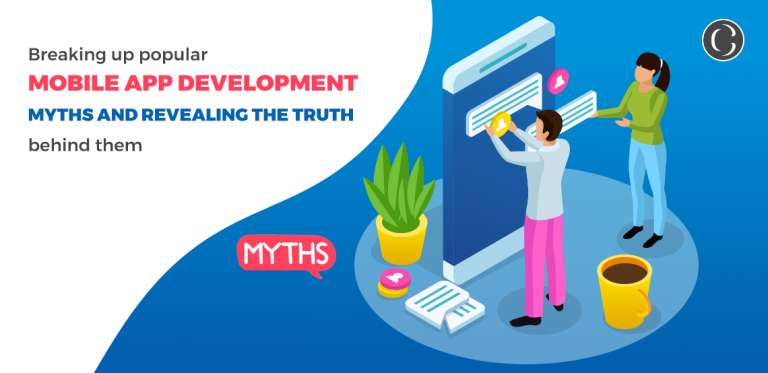Breaking up popular Mobile app development myths and revealing the truth behind them

The mobile app development industry is growing rapidly because today, consumers are increasingly adopting mobile as their medium of choice for routine things like browsing, researching, shopping, banking, etc.
Mobile apps have now become the fundamental rule for the business to grow. Creating an app for your business will increase the market for your products or services. All businesses, that are looking forward to having an app for their businesses, need to define architectures and frameworks that effectively support app development.
But the path of mobile app development is confusing & tricky. Thus there are some myths about mobile app development that need to be debunked.
Let’s get essential knowledge about some popular myths.
Mobile app development: facts v/s fiction
Myth #1: Great idea is everything
Having a unique idea is not everything, you must assess your idea on various scales e.g. practicality, scalable, useful, reliable and feasible. If the idea is exclusive, there’s a chance that users won’t appreciate it that’s why assessing on different scales is very important.
Let’s take an example of Google Wave. Many people have never even heard the name of the app. It was basically a communication tool, but the idea was so unique that Google couldn’t explain the app to consumers.
Myth #2: Mobile app development is just about coding.
This myth is prevailing in a lot of people. The fact is, before you even get to type one letter of code, you need to consider some of the other crucial steps.
From the basic requirements of having knowledge about Android and iOS development to fully designing an app starting with the initial idea, covering functionality design, graphics & user-experience with higher quality are the essential part of the mobile app development.
Once even coding and testing are done then you need to package, beta test and distribute your app along with a marketing strategy to launch your app in a well-thought-out manner.
Even a simple development of any project comprises project managers, developers, business managers, in-house IT representatives, top management representatives and others. So to bring all the stakeholders on the same page to make the development process flawless requires a high level of collaboration.
Myth #3: The more the features, the better is the application.
It is a very popular and dangerous misconception. Because if you develop an app with a lot of features, an app becomes overly complicated to use and you’ll be also investing in features that nobody probably wants.
This simply means that you are mistaking a feature for a benefit. A feature is the fancy part of an app, whereas a benefit relates to the usability of an app. Features don’t make an app great but benefits do.
Myth #4: After launching an app, just wait and watch.
We live in an advertised society where no matter how brilliant your idea is, it is useless without proper marketing so uploading an app is not the end but a start. You need to publicize your app to keep your app relevant in the market.
According to data from analytics firm Localytics nearly 25% of people abandon mobile apps after only one use. So you need to keep engaging with the users by gathering their feedback and insights such as usage statistics.
Myth #5: Mobile app analytic data will accurately show the app performance.
Mobile app analytics won’t help you to gauge the overall app performance.
What you should be doing is looking for screens with minimal engagement, locating the complex engagements, measuring and comparing your app performance on different screens and identifying the screen at which the users leave the app to keeping up with the app performance.
Myth #6: User ratings will increase with high-quality graphics.
Certainly quality of graphics is an important factor in user rating but it is not the only factor.
There are many other important things that contribute to an app’s success e.g. User interface (UI), User experience (UX), easy to use.
Also it is very important that your app defines its purpose clearly because otherwise your users may get confused and uninstall it.
Myth #7: Marketing of an app is a costly affair.
Well paying high for marketing is an easy route to take as it will instantly increase the downloading number but surely not the effective one as it won’t ensure user retention.
There are many free mobile app marketing options are available like Facebook marketing, promoted tweets, boost positive reviews & ratings, email marketing, optimizing your app for app stores, etc.
Developing a high-end and feature-rich application and relishing your first set of customers is very important to have a successful app.
Myth #8: Mobile App Development has a fixed cost and fixed time frame
There are many people, who make a mistake of correlating the physical size of a mobile application with the development time and cost.
But the fact is that the mobile app development process consists of multiple steps such as analysis, design, development, release and measurement. Thus becomes a time-taking task. Based on end-user feedback, features may be eliminated or added which can again alter the time and cost for development.
But developers will give you an estimated cost in advance, so it can help you to make a budget for your project.
Summing up:
Well, these were some of the myths related to mobile app development that needed to be burst to save an app from getting lost in the competition. If you are a businessman and looking forward to having your own application, you can get in touch with the Coruscate, a leading mobile app development company that has huge experience in the mobile industry.
If you have any queries regarding mobile app development then feel free to contact us. We can also give you a personalized quote and app demo.









